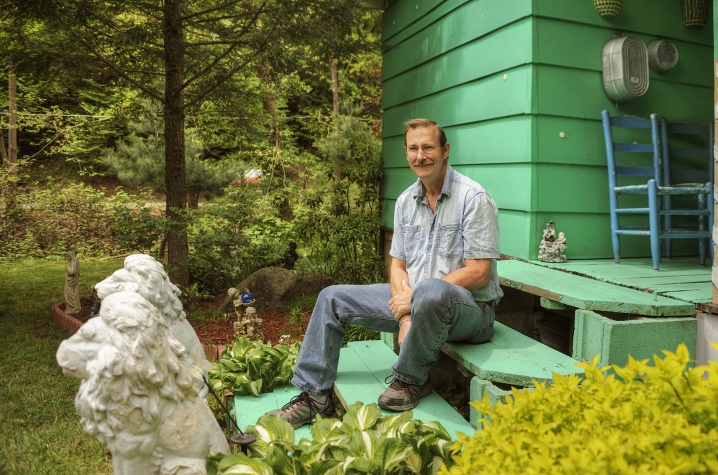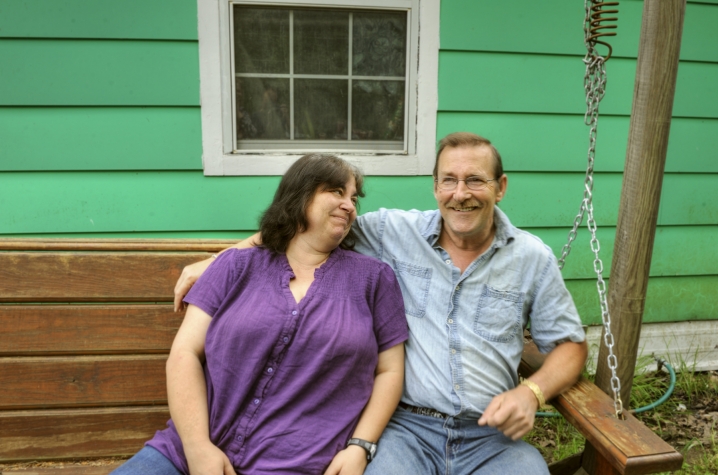They Call It the Widow Maker
LEXINGTON, Ky. (July 18, 2013) — Vickie Rowe knew something was wrong as soon as she saw her husband on the front porch of their Harlan County home.
Bobby Rowe had arisen around 1 a.m. that summer morning to sit on the porch because his arms were hurting. Vickie found him there about 6:20 a.m. “He didn’t know it, but he was in the middle of trying to have a heart attack,” she said. Vickie knew the signs that told her Bobby was in serious trouble. She struggled to move her husband to the living room couch as she called for an ambulance. “When I hung up, he started having a heart attack on the couch,” she said. “He got stiff as a board.”
No warning
The day before Bobby had assembled a trampoline and gone about his day as usual. The 49-year-old security manager was accustomed to active work. He had a hobby of restoring old cars and had recently started to work on a ’63 Impala. Asked if he had any hint of the heart attack to come, he could think of none. Bobby did not care for doctors, so he had not been to one. Both of his parents had had heart disease. Later he would discover that in addition to a family history of heart disease, he also suffered from undiagnosed diabetes, which had silently damaged his heart.
Multiple cardiac arrests
Dr. Nageswara Rao Podapati, a cardiologist working at Hazard ARH Regional Medical Center, later told Vickie that what Bobby experienced that morning at home was the major myocardial infarction, or heart attack. “He said it was the widow maker,” remembered Vickie. It was close to being just that. Bobby suffered several more cardiac arrests during the ordeal June 25, 2012. Rao Podapati was in the process of placing stents to open the blocked arteries when Bobby went into cardiopulmonary arrest, as others on the medical team at Hazard ARH performed chest compressions. A heart attack may or may not cause cardiopulmonary arrest, which is when the heart stops pumping blood to the body’s organs. As the heart stops, breathing may stop completely.
Dr. Hassan Reda, a UK cardiothoracic surgeon, was called into the room. Reda and Dr. Michael Sekela of the UK Gill Heart Institute, provide coverage for their colleague Dr. Edward Setser, UK cardiothoracic surgeon who is based in Hazard. Reda was in the hospital providing outreach service on one of the rare weekends when Setser was out of town. Reda recalls rushing into the room where Rowe was being treated.
“His heart was failing as the pump that pumps the blood through his body. Basically, he died,” Reda said of the patient’s condition at this point.
The stents were key, he said, because “unless you get blood to the heart, there is no hope of recovering the heart.” “He reached the limit to where we decided there was no hope; we could not bring him back,” Reda remembered. But then he noticed a slight trace of blood pressure offering a sliver of hope. Reda urged the team to continue.
Vickie was waiting alone nearby, while the team had been working to resuscitate Bobby for more than an hour. At one point Reda had come to tell Vickie that he would like to call a chaplain for her.
“I don’t need a chaplain. I just need my Bobby,” she said of her husband of 30 years.
When the heart needs assistance
Stents alone were not enough; Bobby also needed a balloon pump. A balloon pump is placed in the aorta to augment the functioning of the heart, said Dr. Charles L. Campbell, a UK cardiologist.
“It’s not a great source of cardiac output, but it’s a pretty good source to help the heart have some output,” Campbell said. He was part of the team treating Bobby after he was transferred to UK Chandler Hospital. Campbell said Bobby was lucky the cardiologist in Hazard was able to put in the stents and balloon pump so quickly. Each attack damages the heart, and Bobby had had several.
The doctors needed to implant stents to restore the blood flow to Bobby’s heart, which would stop the heart attacks. The balloon pump was needed to help Bobby’s damaged heart supply blood to his five-foot, 10-inch frame.
Bringing cardiac expertise closer to the patients
The Gill Heart Institute’s outreach service is designed to support the efforts in local hospitals, so physicians in areas of the state farther from specialized medical care have another source of support in difficult situations like this one.
“It’s a goal of our practice that local hospitals survive and thrive and that we provide the support for things they can’t provide,” Campbell said.
Bobby spent a few days at the Hazard ARH hospital before being transferred to the Cardiothoracic Intensive Care Unit (CTICU) at UK HealthCare in Lexington. He was in an induced coma and on a ventilator – a device that breathes for the patient. Bobby remembers that his arms hurt, and then does not remember anything else until he woke up in the hospital in Lexington, where he stayed for two months.
“We just took our time,” said Campbell, “and we were able to wean the balloon pumps and all the various other pumps away and then transition him to a more straightforward approach to his management.”
Campbell credits the nursing staff in the CTICU with doing the little things to make those transitions easier. Vickie Rowe said the team of providers were all a part of having her husband alive today, but particularly remembered the contribution of nurse Justin Davis as having a major impact. “He watched over Bobby like a chicken hawk,” Vickie said of Davis. “He would not let anything happen to him.”
Davis was nearing the end of his six-month orientation as a new critical care nurse at UK when he took Bobby Rowe as a patient. He remembers the dire condition Bobby was in when he arrived at UK. As a new ICU nurse, he said the expertise of veteran nurses helped him in this case. But he also tries to take cues from the patient.
“It’s always patients first,” he said of his philosophy of care. “The patient comes first, and teamwork is key there.” He also knows the family member who accompanies the patient to the hospital is going through a lot, especially if she is a long way from home and staying at the hospital, as was the case with Vickie Rowe.
While Bobby may have limits to what he can do that he didn’t have before, his prognosis is very good, according to Campbell. He will be returning periodically to Lexington for follow-up care. His diabetes is under control and his wife has changed his diet.
“I can’t tell you how long it’s been since he had a hot dog or a hamburger,” she said laughing, and then admitted she allows red meat once a month. Vickie was pleased with the care throughout her husband’s time at UK and is thrilled with the outcome. “It’s sitting over there in the chair,” she said about Bobby and chuckles.






